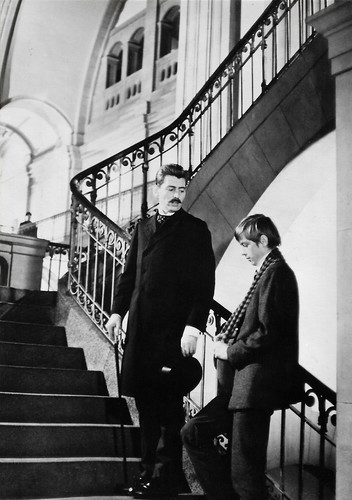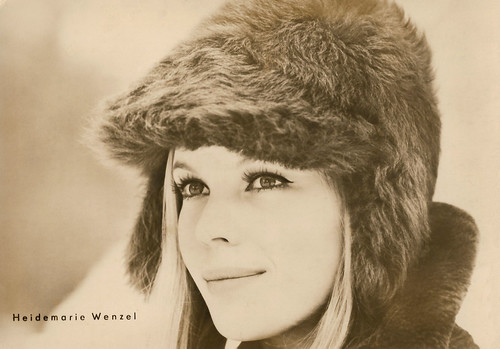Abschied/Farewell (Egon Günther, 1968) has a typical sixties subject: the alienation of young people. Unusual is that the film was made in East-Germany. But typical for this Communist state was that the film was unofficially banned. The fresh and good looking stars of this little gem were Jan Spitzer and Heidemarie Wenzel.

East-German postcard by VEB Progress Film-Vertrieb, Berlin, no. 3278, 1968. Photo: DEFA / Dietrich. Jan Spitzer in Abschied/Farewell (Egon Günther, 1968).

East-German postcard by VEB Progress Film-Vertrieb, Berlin, no. 3279, 1968. Photo: DEFA / Dietrich. Rolf Ludwig, Katharina Lind and Jan Spitzer in Abschied/Farewell (Egon Günther, 1968).

East-German postcard by VEB Progress Film-Vertrieb, Berlin, no. 3281, 1968. Photo: DEFA / Dietrich. Jan Spitzer and Heidemarie Wenzel in Abschied/Farewell (Egon Günther, 1968).
During the 1960s, many films in Hollywood and Europe were made about alienated young men. Abschied/Farewell (Egon Günther, 1968) is another film in that genre, but this one has the distinction of being made in East Germany, a country where you would not imagine a film celebrating non-conformity could be made.
The film was based on 'Abschied' a famous German novel by Johannes R. Becher and SED politician Alexander Abusch contributed to the scenario in an advisory capacity. Also, the society the lead character is rebelling about is Germany in the years leading up to the first World War. This explains how the unconventional film could be made.
In August 1914, amidst the public ecstasy surrounding the impending war, Hans Gastl (Jan Spitzer) is the seventeen year-old son of a prominent prosecutor (Rolf Ludwig) in Munich. The bullying and hypocrisy of his father and the other adults around him sicken him and he drifts into a life of petty crime. Will some new found friends save him from the road to ruin with their talk of socialism and Karl Marx?
He seeks refuge with Fanny (Heidemarie Wenzel), a prostitute who still has the strength for real feelings, but not the strength to break away from her milieu. Gastl finds new friends among artists. But the war turns some of them - once expressive opponents of the war - into fanatical war supporters. The artist Sack, a poet, remains his only companion.
Hans makes a decision: he will not take part in this war. This resolution signifies a turning point in his life; a farewell to his class and his family. His notions of 'transformation' are still nebulous, but are nevertheless linked with a sensible life in a just society.
Abschied/Farewell (Egon Günther, 1968) is a visually striking film, with many shots and editing tricks that owe a debt to the French New Wave films of the 1960s. The film has an anachronistic look. Despite being set in the 1910s, everyone looks like they just stepped out of a 1960s fashion magazine. Director Egon Günther did not want to make a mere literary adaptation but translated it to the current GDR.
The film premiere was on 10 October 1968 in Berlin. Abschied was awarded the title 'Particularly valuable', but soon it was criticised for its "stylistic devices". Egon Günther and Günter Kunert had implemented the novel “as a modern satirical spectacle, anti-bourgeois and pacifist at the same time”. At the 9th plenary session of the Central Committee of the SED on 24 October 1968, the film was sharply criticised. When the film was to be shown at a ceremony in honour of Johannes R. Becher, Walter Ulbricht demonstratively left the cinema shortly before the start of the performance.
Abschied was taken from the East-German cinemas after a short time and later only ran occasionally in individual screenings. While the film never ran on television in the GDR, the ZDF showed him the film 1971 on West-German television. In 2007 the film was released on DVD by Icestorm.

East-German postcard by VEB Progress Film-Vertrieb, Berlin, no. 3282, 1968. Photo: DEFA / Dietrich. Jan Spitzer and Heidemarie Wenzel in Abschied/Farewell (Egon Günther, 1968).

East-German postcard by VEB Progress Film-Vertrieb, Berlin, no. 3283, 1968. Photo: DEFA / Dietrich. Jan Spitzer and Heidemarie Wenzel in Abschied/Farewell (Egon Günther, 1968).

East-German card by VEB Progress Film-Vertrieb, Berlin, no. 3284, 1968. Photo: DEFA / Dietrich. Rolf Ludwig and Jan Spitzer in Abschied/Farewell (Egon Günther, 1968).
Sources: Filmportal.de (German), Wikipedia (German) and IMDb.

East-German postcard by VEB Progress Film-Vertrieb, Berlin, no. 3278, 1968. Photo: DEFA / Dietrich. Jan Spitzer in Abschied/Farewell (Egon Günther, 1968).

East-German postcard by VEB Progress Film-Vertrieb, Berlin, no. 3279, 1968. Photo: DEFA / Dietrich. Rolf Ludwig, Katharina Lind and Jan Spitzer in Abschied/Farewell (Egon Günther, 1968).

East-German postcard by VEB Progress Film-Vertrieb, Berlin, no. 3281, 1968. Photo: DEFA / Dietrich. Jan Spitzer and Heidemarie Wenzel in Abschied/Farewell (Egon Günther, 1968).
A farewell to his class
During the 1960s, many films in Hollywood and Europe were made about alienated young men. Abschied/Farewell (Egon Günther, 1968) is another film in that genre, but this one has the distinction of being made in East Germany, a country where you would not imagine a film celebrating non-conformity could be made.
The film was based on 'Abschied' a famous German novel by Johannes R. Becher and SED politician Alexander Abusch contributed to the scenario in an advisory capacity. Also, the society the lead character is rebelling about is Germany in the years leading up to the first World War. This explains how the unconventional film could be made.
In August 1914, amidst the public ecstasy surrounding the impending war, Hans Gastl (Jan Spitzer) is the seventeen year-old son of a prominent prosecutor (Rolf Ludwig) in Munich. The bullying and hypocrisy of his father and the other adults around him sicken him and he drifts into a life of petty crime. Will some new found friends save him from the road to ruin with their talk of socialism and Karl Marx?
He seeks refuge with Fanny (Heidemarie Wenzel), a prostitute who still has the strength for real feelings, but not the strength to break away from her milieu. Gastl finds new friends among artists. But the war turns some of them - once expressive opponents of the war - into fanatical war supporters. The artist Sack, a poet, remains his only companion.
Hans makes a decision: he will not take part in this war. This resolution signifies a turning point in his life; a farewell to his class and his family. His notions of 'transformation' are still nebulous, but are nevertheless linked with a sensible life in a just society.
Abschied/Farewell (Egon Günther, 1968) is a visually striking film, with many shots and editing tricks that owe a debt to the French New Wave films of the 1960s. The film has an anachronistic look. Despite being set in the 1910s, everyone looks like they just stepped out of a 1960s fashion magazine. Director Egon Günther did not want to make a mere literary adaptation but translated it to the current GDR.
The film premiere was on 10 October 1968 in Berlin. Abschied was awarded the title 'Particularly valuable', but soon it was criticised for its "stylistic devices". Egon Günther and Günter Kunert had implemented the novel “as a modern satirical spectacle, anti-bourgeois and pacifist at the same time”. At the 9th plenary session of the Central Committee of the SED on 24 October 1968, the film was sharply criticised. When the film was to be shown at a ceremony in honour of Johannes R. Becher, Walter Ulbricht demonstratively left the cinema shortly before the start of the performance.
Abschied was taken from the East-German cinemas after a short time and later only ran occasionally in individual screenings. While the film never ran on television in the GDR, the ZDF showed him the film 1971 on West-German television. In 2007 the film was released on DVD by Icestorm.

East-German postcard by VEB Progress Film-Vertrieb, Berlin, no. 3282, 1968. Photo: DEFA / Dietrich. Jan Spitzer and Heidemarie Wenzel in Abschied/Farewell (Egon Günther, 1968).

East-German postcard by VEB Progress Film-Vertrieb, Berlin, no. 3283, 1968. Photo: DEFA / Dietrich. Jan Spitzer and Heidemarie Wenzel in Abschied/Farewell (Egon Günther, 1968).

East-German card by VEB Progress Film-Vertrieb, Berlin, no. 3284, 1968. Photo: DEFA / Dietrich. Rolf Ludwig and Jan Spitzer in Abschied/Farewell (Egon Günther, 1968).
Sources: Filmportal.de (German), Wikipedia (German) and IMDb.







